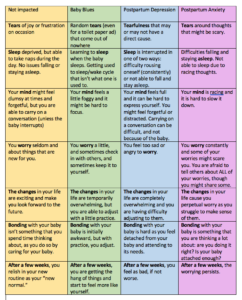Negative Thinking: When to Ask for Help

Do you know where you fall on this chart?
Have you heard or said any of these statements before?
I am weak.
It’s not supposed to be like this.
This is not fair.
Something is wrong with me.
My body failed me.
I’m a bad parent.
I am out of control.
I will never feel normal again.
No one understands me.
If I do something for myself, I am selfish.
If I ask for help, people will think I’m weak and can’t do this by myself.
I should feel loving towards my baby and partner no matter what.
Books, TV, and movies portray the newborn period in a golden white light, where everything is perfect, and the house is immaculate. The reality for many is actually something quite different.
Rarely is the house clean or the laundry done? It’s more likely that parents have been eating take-out or meals delivered by friends and family on paper plates. If the house is clean it is because everything is hidden in a closet or under the bed. The dog has not really been walked in a while and is desperate for attention. The nights are challenging between poor sleep, dirty diapers, and feeding protocols.
When couples believe in the modern myth shown on TV, the reality of life with a newborn can be quite a shock. Couples that can reach out to family and friends for support may have an easier time. There is also a wealth of support available for hire including night nurses, postpartum doulas, housekeepers, and dog walkers. If funds are not available for postpartum help, consider trading off with other new moms in your area and finding a young teenager to be your helper.
Even with the best support, it is possible for the new family to experience postpartum anxiety or postpartum depression. Studies report that 1 in 7 women experience PPD. And paternal postpartum depression (PPPD) is reported to be about 10% but that number is likely to be under-reported given that men tend not to seek out treatment.
Both PPD and PPPD are multifactorial, meaning there is no clear hormonal or biological cause. Rather I believe it is a combination of both. Here are some of the more common risk factors for PPD/PPPD.
- Previous history of anxiety or depression
- Low social support from friends and family
- Marital dissatisfaction or single parent
- Stressful life events and changes
- Obstetrics complications
- An unplanned pregnancy
- Unrealistic expectations
- Teen pregnancy
- Previous history of pregnancy or neonatal loss
- Family history of postpartum mental health issues
- Infertility
If you find yourself showing any of these PPD/PPPD criteria, please reach out to someone immediately for assistance with management.
- Depressed mood
- Significant appetite or weight changes
- Sleep disturbances
- Fatigue or low energy affecting daily events
- Excessive feelings of guilt or worthlessness
- Impaired concentration
- Concerns around hurting yourself, your partner, or your children.
- Prone to anger
- Increased drinking/substance use
Online resources to help you find someone in your area are: postpartumprogress.com and www.postpartum.net
